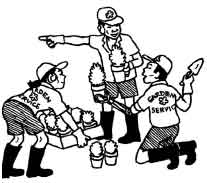Your progress
0%
Here are some of the key ideas underlying skills development.
Use your mouse or keyboard to expand each of the headings below.
Four types of skill are required for successful work:
CBR personnel, when identifying opportunities for skills development, should bear in mind that every individual has his or her own particular interests, talents and abilities.When deciding which skills development opportunities to pursue, each individual, along with his or her family members, must be able to make his or her own decision.
Girls and boys, women and men should all be given equal opportunities for training, and these should not be limited to traditional gender roles and segregation. Women and girls with disabilities may need additional support to take up training opportunities. The maximum choice of options should be given, and these should not be based on preconceived ideas of what the individual is capable of doing.

There are a number of ways people with disabilities can learn and develop the knowledge, skills and attitudes necessary to earn their livelihood. These include:
The choice of the most appropriate method of skills development depends upon the interests, capabilities and resources of the individual, as well as the opportunities and support available in the community.
Learn about a Chinese peasant with a severe physical disability who taught himself to repair watches with his feet.


Zou was born into an ordinary immigrant peasant family from Yi Chang in Hubei province of China in 1951. He cannot move his arms because of serious malformation and has to depend on his feet for all daily living skills. He had no chance to study in a school. He learned different skills, but the income was not enough for his survival. He started learning watch repairing, for which he had to train and develop dexterity in his feet – he trained his toes to act like fingers by attracting ants with sugar and then picking the ants up with his toes. After several years of arduous effort, he was good at watch repairing and opened a watch-repairing shop.
So Zou now earns his living and supports his family by watch repairing. His daughter graduated from university and became a nurse. Zou is enthusiastic about public services for people with disabilities and launched a telephone hotline to provide psychological services and counselling for people with disabilities at his own expense.
Zou is a role-model for many people with disabilities in his province. According to him, “I am not afraid of poverty and disability. I succeed through my effort, intelligence and decision. Disability is not terrible; drawing back of the mind is the most terrible. I am always strong at any time and believe that I can overcome any difficulty.”